
What’s happening: AMD is laying off around 1,000 employees—roughly 4% of its workforce—as part of a strategic shift to focus more on AI chips, a fast-growing segment dominated by rival NVIDIA.
Why it matters: The layoffs target sales and marketing roles in the gaming and consumer PC divisions, areas where AMD has faced recent struggles. By realigning resources, AMD aims to strengthen its foothold in the AI chip market, a space expected to balloon to $500 billion by 2028. This move highlights AMD's intent to be more competitive against Nvidia, which currently holds an 80% market share in AI chips.
The backdrop:
- AMD, the second-largest GPU producer after NVIDIA, is betting big on data centers and AI accelerators. Its AI chip, the MI300X, is used by companies like Meta and Microsoft as an alternative to NVIDIA's systems.
- Despite these efforts, AMD's stock has dropped 5% this year, while NVIDIA shares have surged by 200%, making NVIDIA the world’s most valuable publicly traded company.
- AMD's gaming segment, which originally drove its GPU growth, is expected to see a significant decline in revenue, down nearly 59% in 2024, largely due to waning consumer demand.
What they're saying: "As a part of aligning our resources with our largest growth opportunities, we are taking a number of targeted steps that will unfortunately result in reducing our global workforce by approximately 4%," an AMD spokesperson said, adding that impacted employees would be treated with respect and assisted through the transition.
Zoom out: AMD's restructuring comes as the company seeks to pivot towards high-growth markets like data center AI accelerators, hoping to compete against NVIDIA’s AI dominance. This transition underscores a broader trend: tech companies increasingly prioritizing AI development at the cost of traditional segments.
What's next: AMD plans to continue investing in AI, with CEO Lisa Su highlighting significant growth opportunities across its data center, AI, and embedded chip businesses. The company remains optimistic, expecting AI chip sales to reach $5 billion this year, about 20% of its projected total revenue.

